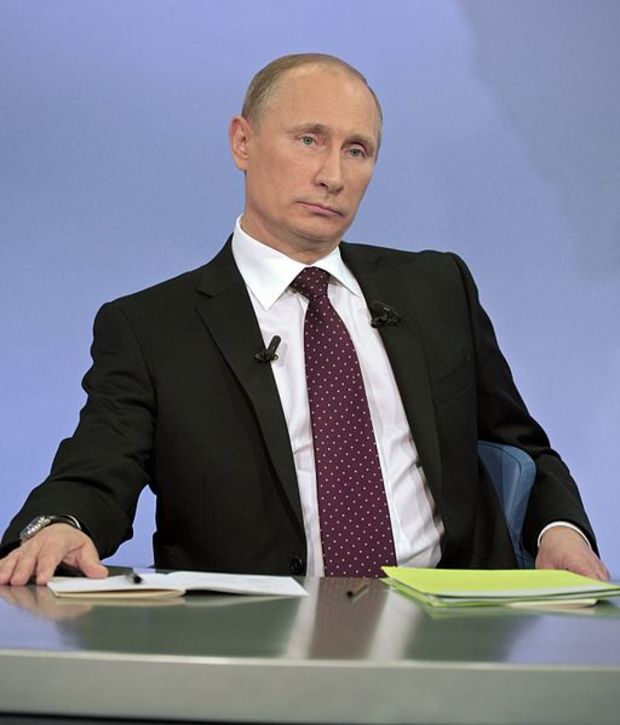Russian President Vladimir Putin has achieved his short-term objective of fomenting chaos in Ukraine to prevent the country from exercising the political and economic independence desired by the vast majority of its people. But he has also boxed himself into a corner and risks losing everything in the long run.
Putin’s actions are driven by his desire to protect the corrupt business interests of his ruling clique, particularly the control of oil and gas exports via Ukrainian pipelines on which his regime depends. He is also terrified of the demonstration effect. If public pressure leads to a democratic and non-corrupt government being established in fraternal Ukraine, then millions of Russians will wonder why it could not happen in their country too.
The oft-cited suggestion that the EU, NATO and “the West” in general are somehow responsible for Putin’s appalling actions is nonsensical. Ukraine is an independent country. If the majority of its people choose to seek the freedom, security and prosperity that we in countries like the UK take for granted, no foreign dictatorship has the right to deny them that choice.
Rather than being the result of EU and NATO activity, Russia’s actions in Ukraine are a graphic illustration of why the nations it has long oppressed, such as Poland, the Czech Republic and the three Baltic States, are so keen to be tied to these institutions. Instead of raging about being repeatedly jilted, the Russians might best serve their future interests by asking themselves why their neighbours loath them so much.
Putin’s brand of corrupt despotism is deeply unattractive to the citizens of adjacent countries. Despite his skill in executing cynical, short-term tactical manoeuvres, he now faces a strategic problem at home too. His power over Russia rests on his being able to share out the spoils of the economy with a corrupt elite and denying his people a role in politics in exchange for providing them with rising living standards. His intervention in Ukraine has put at risk his long-term ability to fulfil either bargain and left him with few good options.
Putin could follow the precedent he set in Crimea and invade the rest of Ukraine. He might still do so, although it is noteworthy that having gone to great lengths to set up a pretext for an invasion, he has so far hesitated to do it. His army could probably take most of Ukraine quite quickly. But Putin must know that his forces are too incompetent, ill-equipped and unmotivated to occupy it successfully for long in the face of the inevitable mass Ukrainian resistance. For evidence, just look at the Russian military’s inability to suppress the much smaller territory of Chechnya – which was only finally brought under some sort of brutal control by outsourcing the job to other Chechens.
Occupying the South Eastern corner of Ukraine around Donetsk, whether directly or via the proxies he is currently using, might be more feasible. Indeed, the ludicrously bogus “referendum” held in the region on 11th May seems designed to pave the way for this step. But it is instructive to see how few locals have been inspired into action by Putin’s rabble rousers. Rather than mirroring the massive demonstrations in Kiev that ousted ex-President Yanukovych, the “uprising” in the South East has seen only relatively small numbers of thugs, the deluded and the disaffected actively participating in the pro-Russian cause.
This is not to say that the majority of people in regions such as the Donbass are enamoured of the Ukrainian government, particularly after the bloodshed of recent days. But being lukewarm about Ukraine does not automatically indicate ardour for Russia. There is often a misconception, amplified by the Russians, about the people of that region. Most of them do indeed speak Russian, rather than Ukrainian. But, similarly, most Irish people speak English without harbouring a desire to be English. The misfortune of people in the Donbass is that neither Ukraine nor Russia has done much to inspire their loyalty since its heyday as the proud industrial heartland of the Soviet Union.
More...
Even if some sort of sullen Russian occupation or remote control over the Donbass regions of Donetsk and Luhansk could be exerted, the net result of Putin policies is to have alienated the rest of Ukraine to such a degree that even those who formerly felt kinship with Russia now distrust it deeply. As a result, they have developed a stronger desire to entwine Ukraine with the rest of Europe – the very eventuality that Putin aimed to prevent by intervening in the first place.
Whatever Putin’s current plans are, the West should use all of the levers at its disposal to deter further Russian trouble-stoking and the nightmare scenario of all-out war. The Russian regime has many vulnerable points and there is much that can be done to exert pressure on it without having to get embroiled in any fighting.
The sanctions imposed so far on Russia have been mild. But they have been calibrated to offer a discouraging taster of the damage that could be inflicted on the vulnerable Russian economy and, therefore, Putin’s grip on power. They have already been sufficient to start an exodus of capital from Russia, have its credit rating downgraded to near junk status and deter global businesses from investing in the country. Despite some kowtowing by firms that are already deeply committed in Russia, it is hard imagine many company boards approving the capital expenditure in Russia that it desperately needs anytime soon.
Paralysing a few more Russian banks, particularly ones connected to the corrupt engine of the government’s economic power, Gazprom, is a next step that could easily be taken by the outside world, at minimal cost to itself. The fear of Russia cutting off gas supplies should not be exaggerated. Several European countries do depend heavily upon Russian gas – but not as much as the entire Russian economy and personal wealth of its elite depends on selling it to us, as demonstrated by the uninterrupted supply during the Cold War and other crises.
The Russian regime is also unusually vulnerable to personally targeted sanctions. Most of the elite have substantial proportions of their ill-gotten gains stashed outside the country. Further embargoing the property and wealth of the oligarchs and Putin’s closest cronies in government would encourage them to put pressure on him to change course. More extensive visa bans to prevent them from travelling would also ramp up the pressure. Not being allowed to visit would focus the minds of those senior government figures who own exclusive properties around Europe and have kids in English public schools, despite their modest official salaries.
These actions should be bolstered by providing more support to Ukraine. The EU should immediately offer and sign an association agreement on much more generous terms than the one Putin torpedoed, via Yanukovych, in February. The IMF and the US should provide further financial support and debt cancellation. But rather than offering a blank cheque in a time of crisis, the Ukrainian government’s need for aid should be leveraged to make this support contingent on the reforms demanded by the brave people who demonstrated through the winter in Kiev.
As European history demonstrates amply, appeasement and a failure to stand up to dictators like Putin only leads to more trouble and pain in the end. Fortunately, Putin is vulnerable. But time is short and tougher action needs to be taken against him before the events he has stirred up in Ukraine accelerate further out of control.


